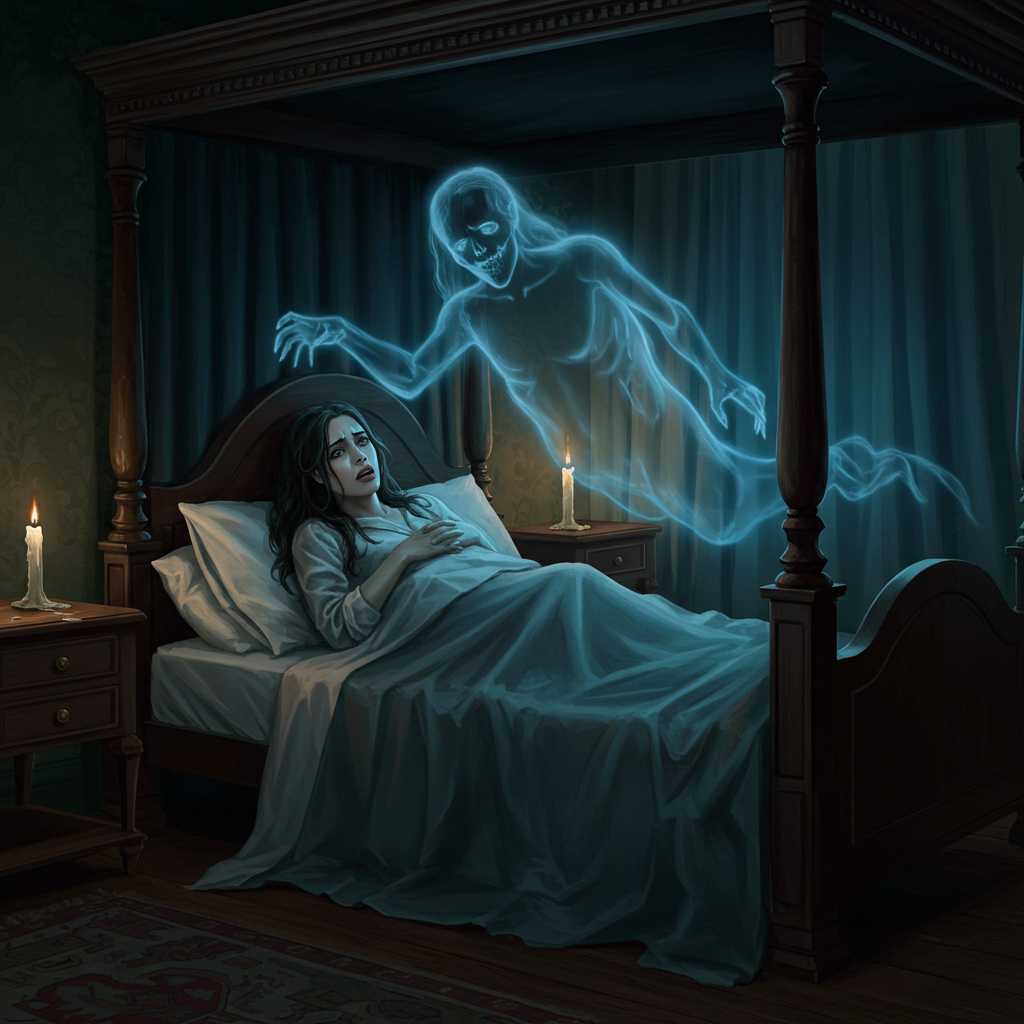The Apparition
John Donne
1572 to 1631

When by thy scorne, O murdresse, I am dead,
And that thou thinkst thee free
From all solicitation from mee,
Then shall my ghost come to thy bed,
And thee, fain'd vestall, in worse armes shall see;
Then thy sicke taper will begin to winke,
And he, whose thou art then, being tyr'd before,
Will, if thou stirre, or pinch to wake him, thinke
Thou call'st for more,
And in false sleepe will from thee shrinke,
And then poore Aspen wretch, neglected thou
Bath'd in a cold quicksilver sweat wilt lye
A veryer ghost then I;
What I will say, I will not tell thee now,
Lest that preserve thee; and since my love is spent,
I'had rather thou shouldst painfully repent,
Then by my threatnings rest still innocent.
John Donne's The Apparition
John Donne’s The Apparition is a striking example of metaphysical poetry, blending raw emotion with intellectual complexity. The poem, written in the early 17th century, exemplifies Donne’s characteristic wit, his fascination with love and death, and his ability to fuse the visceral with the cerebral. At its core, The Apparition is a bitter, vengeful address from a spurned lover to his indifferent mistress, in which he foretells a haunting posthumous retribution. The poem’s power lies in its unsettling imagery, its psychological intensity, and its manipulation of conventional Petrarchan tropes, subverting them into something darker and more disturbing.
This essay will explore The Apparition through multiple lenses: its historical and literary context, its thematic preoccupations, its use of poetic devices, and its emotional resonance. Additionally, we will consider how Donne’s personal experiences and philosophical inclinations may have shaped the poem, as well as its place within the broader tradition of Renaissance love poetry.
Historical and Literary Context
To fully appreciate The Apparition, we must situate it within the early 17th century, a period marked by dramatic shifts in poetic expression. The Renaissance had already seen the flourishing of Petrarchan sonnets, in which unrequited love was often idealized and the beloved was elevated to an almost divine status. Donne, however, belonged to the Metaphysical school of poets, who rejected such idealization in favor of more complex, often paradoxical explorations of love, religion, and human frailty.
Donne’s own life was marked by romantic and professional turbulence. After a clandestine marriage to Anne More in 1601—an act that ruined his career prospects—he experienced both deep love and profound hardship. While The Apparition predates his later, more devotional works, it reflects a mind deeply engaged with themes of mortality, betrayal, and the blurred boundaries between the physical and spiritual realms. The poem’s vengeful tone may also be read as a reaction to the Petrarchan tradition, in which the male lover suffers passively. Here, the speaker refuses such passivity, instead promising supernatural retaliation.
Themes: Love, Death, and Vengeance
At its heart, The Apparition is a poem about the aftermath of rejection. The speaker, addressing his cruel beloved as a "murdresse," frames her disdain as a fatal act—his death is not literal but emotional, yet he imagines it with the gravity of a physical demise. This conflation of emotional and bodily suffering is a hallmark of Donne’s work, seen also in The Broken Heart and The Funeral.
The central conceit—that the speaker’s ghost will return to haunt his former lover—draws on the Renaissance fascination with the supernatural. Yet Donne’s treatment is not merely Gothic; it is psychologically astute. The haunting is not spectral in the traditional sense but operates through the woman’s own guilt and fear. The poem suggests that her future lover will be so exhausted by her ("being tyr'd before") that he will misinterpret her distress as insatiability, leaving her isolated in a "cold quicksilver sweat." The horror here is not in a literal ghost but in the psychological torment of being misunderstood and abandoned.
The final lines—"What I will say, I will not tell thee now, / Lest that preserve thee'; and since my love is spent, / I'had rather thou shouldst painfully repent, / Then by my threatnings rest still innocent"—reveal a perverse desire for delayed punishment. The speaker withholds the specifics of his revenge to ensure her suffering is prolonged, suggesting that his love has curdled into something darker. Unlike Petrarchan lovers, who pine eternally, Donne’s speaker seeks active retribution.
Literary Devices and Imagery
Donne’s mastery of poetic technique is evident throughout The Apparition. The poem is rich in dramatic monologue, allowing the speaker’s voice to dominate with biting irony. The opening apostrophe—"O murdresse"—immediately establishes an accusatory tone, framing the beloved as a killer. This legalistic language (echoing Donne’s own training in law) transforms romantic rejection into a capital crime.
The imagery is visceral and unsettling. The "sicke taper" (a dying candle) flickering in the bedroom evokes both the fragility of life and the dimming of passion. The description of the woman’s future lover shrinking from her in "false sleepe" suggests not only his exhaustion but his subconscious revulsion, reinforcing her eventual isolation. The phrase "cold quicksilver sweat" is particularly striking—mercury (quicksilver) was associated with both poison and elusiveness, implying that her fear is both toxic and inescapable.
Donne also employs paradox to heighten the poem’s tension. The speaker calls his beloved a "fain'd vestall" (false virgin), mocking her chastity as performative. This aligns with Donne’s broader skepticism toward idealized love; in The Apparition, purity is a façade, and desire is fraught with cruelty.
Comparative Readings and Philosophical Underpinnings
The Apparition can be usefully compared to other revenge poems, such as Shakespeare’s Sonnet 129 ("Th' expense of spirit in a waste of shame") or even later works like Browning’s Porphyria’s Lover. However, Donne’s poem is distinct in its focus on psychological rather than physical vengeance. The speaker does not seek to kill his beloved but to ensure her emotional torment mirrors his own.
Philosophically, the poem engages with Renaissance ideas about the afterlife and the soul’s agency. Donne, who later wrote extensively on death in his Holy Sonnets, seems preoccupied with how human emotions transcend mortality. The ghost here is not a supernatural entity but a manifestation of lingering resentment, suggesting that emotional wounds outlast the body.
Emotional Impact and Modern Relevance
Despite its early modern context, The Apparition remains startlingly relevant in its portrayal of toxic relationships. The speaker’s desire for revenge—his insistence that his former lover "painfully repent"—resonates in an age where discussions of emotional abuse and manipulation are increasingly nuanced. The poem forces us to confront uncomfortable questions: Is the speaker justified in his anger, or has his love turned pathological? Is the woman truly cruel, or is her rejection merely a natural act of autonomy?
Donne does not provide easy answers, and that ambiguity is part of the poem’s enduring power. Unlike the tidy resolutions of Petrarchan sonnets, The Apparition lingers in discomfort, refusing catharsis. The final lines, with their deliberate withholding of the ghost’s words, leave the reader—like the beloved—in uneasy suspense.
Conclusion
The Apparition is a masterful exploration of love’s darker permutations. Through its vivid imagery, psychological acuity, and subversion of poetic conventions, Donne crafts a work that is as unsettling as it is intellectually compelling. The poem stands as a testament to the Metaphysical poets’ ability to fuse emotion with intellect, creating verse that is both visceral and philosophically rich.
In the end, The Apparition is not merely a ghost story but a meditation on how love, when twisted by rejection, can become something monstrous. It challenges us to consider the fine line between passion and possession, between heartbreak and vengeance. And in doing so, it remains one of Donne’s most haunting—and haunted—works.
This text was generated by AI and is for reference only. Learn more
Want to join the discussion? Reopen or create a unique username to comment. No personal details required!



Comments
No comments yet. Be the first to comment!